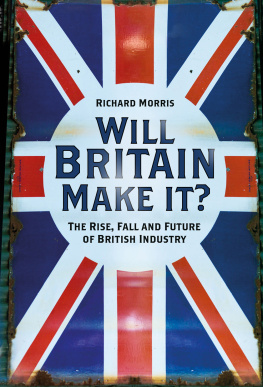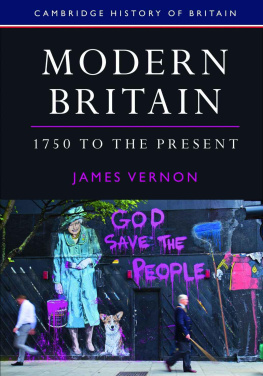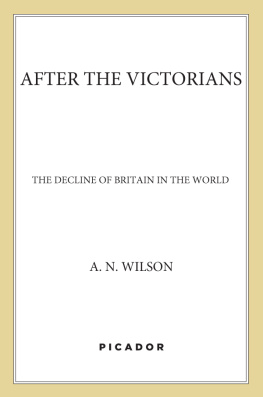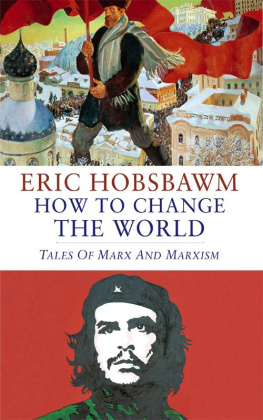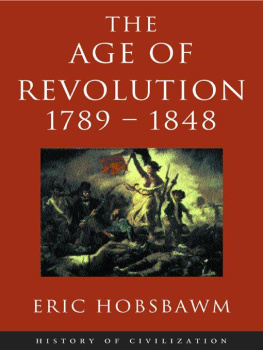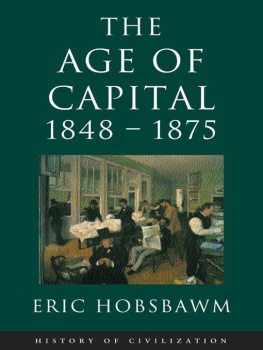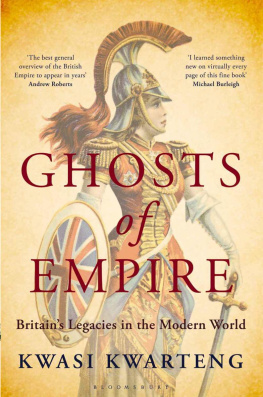PENGUIN BOOKS
INDUSTRY AND EMPIRE
Eric J. Hobsbawm was born on 9 June 1917. He was educated in Vienna, Berlin, London and Cambridge, where he was a Fellow of King's College from 1949 to 1955. He was Professor of Economic and Social History at Birkbeck College, University of London, from 1970 to 1982, having also taught at Stanford and M.I.T. He has been Emeritus Professor of Economic and Social History at the University of London since 1982 and teaches at the New School for Social Research in New York. He was made a Fellow of the British Academy in 1976. His main publications include Primitive Rebels (1959), The Age of Revolution (1962), Labouring Men (1964), Captain Swing (1969; with George Rud), Bandits (1969), Revolutionaries (1973), The Age of Capital 18481875 (1975), The Italian Road to Socialism (1977), The Invention of Tradition (1983; with Terence Ranger), Worlds of Labour (1984), Nations and Nationalism Since 1780 (1990), Age of Extremes (1994) and On History (1997). Professor Hobsbawm, who lives in London, is married, with two children.
Chris Wrigley is Professor of Modern British History and Head of the School of History and Art History at Nottingham University. His books include David Lloyd George and the British Labour Movement (1976), Arthur Henderson (1990), Lloyd George and the Challenge of Labour (1990) and Lloyd George (1992). He has edited three volumes of A. J. P. Taylor's essays, From Napoleon to the Second International (1994), From the Boer War to the Cold War (1996) and British Prime Ministers and Other Essays (1999), all of which are published in Penguin. He was President of the Historical Association for the period 19969.
INDUSTRY AND EMPIRE
From 1750 to the Present Day

E. J. HOBSBAWM
This edition revised and updated with
CHRIS WRIGLEY

PENGUIN BOOKS
For Marlene
PENGUIN BOOKS
Published by the Penguin Group
Penguin Books Ltd, 80 Strand, London WC2R 0RL, England
Penguin Putnam Inc., 375 Hudson Street, New York, New York 10014, USA
Penguin Books Australia Ltd, 250 Camberwell Road, Camberwell, Victoria 3124, Australia
Penguin Books Canada Ltd, 10 Alcorn Avenue, Toronto, Ontario, Canada M4V 3B2
Penguin Books India (P) Ltd, 11 Community Centre, Panchsheel Park, New Delhi 110 017, India
Penguin Books (NZ) Ltd, Cnr Rosedale and Airborne Roads, Albany, Auckland, New Zealand
Penguin Books (South Africa) (Pty) Ltd, 24 Sturdee Avenue, Rosebank 2196, South Africa
Penguin Books Ltd, Registered Offices: 80 Strand, London WC2R 0RL, England
www.penguin.com
Commissioned by Penguin Books Ltd and first published by Weidenfeld & Nicolson 1968
Published in Pelican Books 1969
Published in Penguin Books 1990
Revised edition 1999
Copyright E. J. Hobsbawm, 1968, 1969, 1999
Chapter 16 copyright C. J. Wrigley, 1999
All rights reserved
The moral right of the author has been asserted
Except in the United States of America, this book is sold subject to the condition that it shall not, by way of trade or otherwise, be lent, re-sold, hired out, or otherwise circulated without the publisher's prior consent in any form of binding or cover other than that in which it is published and without a similar condition including this condition being imposed on the subsequent purchaser
ISBN: 978-0-14-192620-9
CONTENTS
PREFACE
T HIS book will certainly be read by some who wish to pass one or other of the numerous examinations in economic and social history which face students today, and I naturally hope that it will help them to do so. However, it is not designed simply as a textbook, nor can it be used very profitably as a book of reference. It attempts to describe and account for Britain's rise as the first industrial power, its decline from the temporary domination of the pioneer, its rather special relationship with the rest of the world, and some of the effects of all these on the life of the people in this country. All these matters should be of interest to any intelligent citizen, and I have therefore tried to write in as non-technical a way as possible and to assume no prior knowledge of any of the social sciences in the reader. This does not mean that the questions asked (and I hope answered) here in ordinary prose could not be reformulated in the more technical language of the various disciplines. However, I have assumed an elementary knowledge of the outlines of British history since 1750. It would be helpful if readers who happen not to know what the Napoleonic Wars were, or are ignorant of names such as Peel and Gladstone, were prepared to find out on their own.
Since neither the questions nor the answers about British economic and social history are universally agreed upon, I am unable to say that this book represents the consensus of scholars. It is pleasant to observe that British economic and social history of the past 200 years is now a subject in which research is intense and discussion lively and sometimes passionate, but of course this makes the task of the historian who wishes to give a general interpretation of the entire period much more difficult. Part of the difficulty is due to the curious situation of economic history which, as a specialized field of enquiry, serves both the needs of historians and of economists, whose paths, or at least whose needs, have increasingly diverged. Economics has become an increasingly specialized mathematical discipline. Since the first publication of this book a branch of economic history known by such names as new economic history or cliometrics, which essentially uses technically sophisticated quantification to verify or falsify the propositions of economic theory as they apply to economic history, has become much more prominent. At the same time the development of an ill-defined but increasingly large field of social history has pulled a part of the subject matter of economic history, as traditionally practised, in a different direction, while new and important fields, such as women's history, have emerged in the same general area but with more specialized interests. Since the 1960s economic history has also been increasingly observed, with scepticism, by researchers interested less in what happened and why than in how people, and notably current historians, construct their theories about it. Fortunately most people interested in economic history believe that it raises questions which require answers, but each of these fields is preoccupied by particular questions to which it gives particular answers.
So readers might as well be clear about what questions are asked and (hopefully) answered in this book. The authors assume that the central theme of the economic history of the modern world is that of the development and transformations of the capitalist world economy. Britain was both the first industrial nation and, from the eighteenth century until the early twentieth, the central pillar in the construction of the world economy. Why this was so, what Britain's relations were with the world of empire and economic dependency, how the country was affected both by its pioneer achievements and by the rise of other and more modern industrial powers: these are some of the questions Industry and Empire is concerned with. Whether the answers given in this book will prove to be true is uncertain, though naturally I hope they will. Whether they make sense and a coherent whole is something which readers must judge for themselves.
Next page

